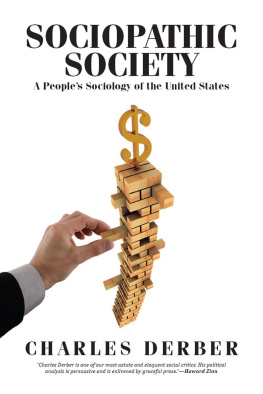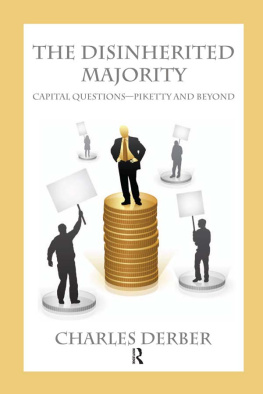SOCIOPATHIC SOCIETY
OTHER BOOKS BY CHARLES DERBER
Marxs Ghost (2011)
By using a time capsule technique to bring back Karl Marx to the 21st century, Charles Derber engages him in an illuminating taboo-shredding conversation about economies, workers, corporations, and governments. Derber opens minds, challenges facile assumptions, and liberates conventional inhibitions.
RALPH NADER
Greed to Green (2010)
Theres no way to solve climate change without also shifting, in profound ways, our idea of what constitutes success and growth and progress. This is the right book at the rightand crucialmoment.
BILL MCKIBBEN, author of The End of Nature and creator of the student-based Step It Up campaign to cut carbon emissions and of 350.org, todays leading climate change movement
The Wilding of America, 4th ed. (2006)
The Wilding of America holds the glass up to our time, and one winces at the likeness.
JACK BEATTY, Atlantic Monthly and On Point political analyst at NPR
Hidden Power (2005)
Hidden Power is the must-read book of the year. Buy three copies, at least, because youll want to share a few with friends, and will never want to part with your own well-marked-up copy.
THOM HARTMANN, best-selling author and host of Air America
Hidden Power was selected as one of the top three current events books by the Independent Book Publishers Association.
Regime Change Begins at Home (2004)
Derber provides a penetrating and compelling analysis of why this particular regimes days are numbered.
JULIET SCHOR, author of The Overworked American and Born to Buy
People before Profit (2003)
Professor Derbers impressive analysis is an important contribution to the ongoing worldwide debate about globalization.
SENATOR EDWARD KENNEDY
The Pursuit of Attention (2000)
Competition and individualism in America are fresh topics in his hands, and he works out a theory of great interest.
RICHARD SENNETT, author of Hidden Injuries of Class and The Corrosion of Character
Corporation Nation (2000)
A work of generous imagination and a sober plan of action for Americans committed to a truly just and equitable social order.
JONATHAN KOZOL, author of Amazing Grace and Savage Inequalities
Power in the Highest Degree (1990) coauthored with William Schwartz and Yale R. Magrass
An excellent guide to understanding the system of Mandarin capitalism and its wideranging human consequences.
NOAM CHOMSKY, author of Perilous Power (2006)
SOCIOPATHIC SOCIETY
A Peoples Sociology of the United States
CHARLES DERBER

First published 2013 by Paradigm Publishers
Published 2016 by Routledge
2 Park Square, Milton Park, Abingdon, Oxon OX14 4RN
711 Third Avenue, New York, NY 10017, USA
Routledge is an imprint of the Taylor & Francis Group, an informa business
Copyright 2013, Taylor & Francis.
All rights reserved. No part of this book may be reprinted or reproduced or utilised in any form or by any electronic, mechanical, or other means, now known or hereafter invented, including photocopying and recording, or in any information storage or retrieval system, without permission in writing from the publishers.
Notice:
Product or corporate names may be trademarks or registered trademarks, and are used only for identification and explanation without intent to infringe.
Library of Congress Cataloging-in-Publication Data
Derber, Charles.
Sociopathic society : a peoples sociology of the United States / Charles Derber.
pages cm
Includes bibliographical references.
ISBN 978-1-61205-437-7 (hardcover : alk. paper)
ISBN 978-1-61205-438-4 (pbk. : alk. paper)
1. AvariceUnited States. 2. AcquisitivenessUnited States. 3. ViolenceUnited States. 4. CapitalismUnited States. 5. ValuesUnited States. 6. United StatesSocial conditions. I. Title.
BJ1535.A8D47 2013
306.0973dc23
2013021151
ISBN 13 : 978-1-61205-437-7 (hbk)
ISBN 13 : 978-1-61205-438-4 (pbk)
Designed and Typeset by Straight Creek Bookmakers.

Contents

Noam Chomsky
A prominent theme in current policy discourse is Americas decline as power allegedly shifts to the rising giants China and India. The range of opinion, and the common concerns, are revealed very well in the year-end editions of the most prestigious of the US establishment journals, Foreign Affairs, the journal of the Council of Foreign Relations. In December 2012, in bold face and oversize letters, the front cover read, Is America Over? The lead article called for retrenchment in the humanitarian missions abroad that are consuming the countrys wealth. Less than a year later in the same journal, the lead article questioned whether retrenchment is the right policy or whether the US should continue to reign worldwide in the interests of global peace and justice.
True, the world is not exactly pleading for Washington to carry forward its campaign of disinterested benevolence, particularly the Global South, its main target since the US replaced Britain as global hegemon after World War II. But there is a simple response to such objections, the one given by the British Foreign Office at the wars end, when it recognized that the economic imperialism of US business interests is quite active under the cloak of a benevolent and avuncular nationalism, which is attempting to elbow us out. As officials ruefully observed, US elites believe that the United States stands for something in the worldsomething of which the world has need, something which the world is going to like, something, in the final analysis, which the world is going to take, whether it likes it or not. And they had the power to try to compel the world to take it.
Among US elites, little has changed, as the debate between the two extremes illustrates. Nevertheless, by now the decline in US power that began a few years after the war has become a matter of serious concern as global power has become diversifiedthough despite the relative decline, the United States faces no competitor for global domination in the foreseeable future.
Ignored in the debate over Americas decline is the fact that it is to a large extent self-administered, beginning in the 1970s and escalating sharply under Reagan and his successors. In the 1970s the economy was substantially redesigned, shifted to financialization, with radical changes in the nature of banks along with no less radical growth in their scale. By 2007, on the eve of the latest crash, for which they were largely responsible, the financial institutions earned about 40 percent of corporate profits. They were quickly bailed out under the governments too-big-to-fail insurance policythe TARP bailout that received so much attention was the least of itand by now the major banks are bigger and more powerful than ever, while bonuses are munificent and the perpetrators are immune.
Production did not cease as finance moved to a dominant role. It was sent offshore, to places where labor could be more harshly exploited and environmental concerns of the kind introduced under Richard Nixonthe last liberal presidentcould be ignored. By now corporate profits across the board are enormous.
Next page





